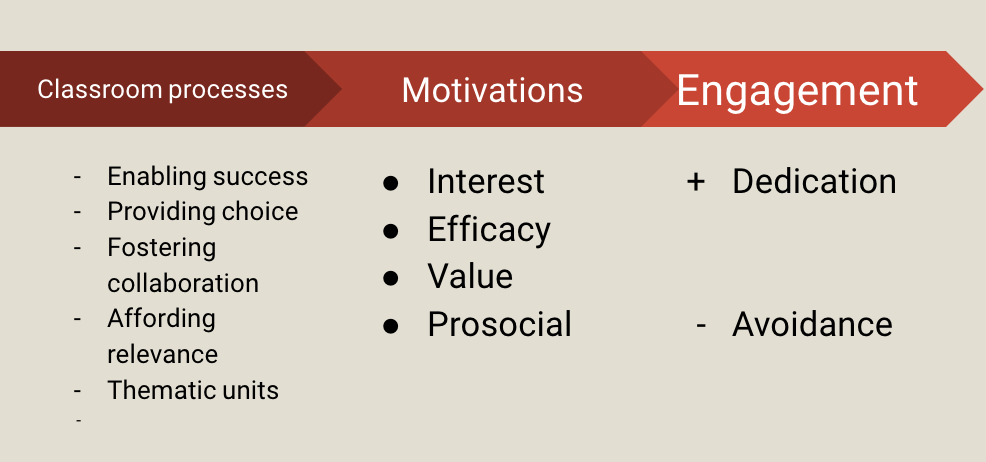The session began with us discussing what we do in Writing that had lead to acceleration across all cohorts, all over New Zealand. We came to an agreement that some of the core things our teachers do in Writing are provide milage, authentic audience, genuine purpose for reading, and timely feedback. This is also peered with clear teacher understanding of levels and what each level looks like.
We were then challenged to think about Reading. What can we do in reading, that we are already doing in writing that may lead to it's acceleration? How do we use libraries? How do reading sessions run? Are we using any of the digital tools to support reading (think turning captions on youtube, using talk to text and then re-reading to increase fluency)?
All of us agreed that there is more we could and should be doing.
We then moved on to the difference between engagement and motivation. Here are some slides that helped break it down (sourced from Rebecca's Slide Deck).
Motivation is internal drivers - the why of reading.
Engagement is the ‘act’ of reading to achieve something.
Motivation does not predict reading achievement however engagement does.
Classroom practice and conditions impact motivations to read, which in turn impact behavioral engagement and dedication in reading. These latter processes, behavioral engagement and dedication, ultimately predict reading competence (Nauman, 2016).
A hook for reading gets the engagement and leads to increased motivation and reading achievement. This has huge relevance especially culturally, it is critical for engagement.
Some core messages from Rebecca are:
You are not teaching the text you are teaching the reader.
Teachers need to empower students to know that they are correct on their own without the
teacher confirming.
Teachers need to empower students to know that they are correct on their own without the
teacher confirming.
Do not over help, prepare the student for when the teacher is not there.
e.g. As a learner when I come up to a problem I need to know multiple ways how to solve it - I also need to be aware when I have not solved it and also when I have. I need to be able to monitor myself.
As a teacher say what are you going to try? Before saying what to try.
You know what to try, go try it
We need to be teaching that it can be uncomfortable when you are learning.
The model for how to get reading happening - classroom processes 
You layer your understanding of something by reading it in multiple places, multiple perspectives and with multiple modes.
Book Introductions / The Hook
A student should know ...
is there a reason to dedicate my time to reading this text?
why should I read this text?
am I being persuaded with the introduction? Or manipulated by the book cover?
Depth of theme and universality is important to the introduction of why a student should read a text.
A high quality environment for reading looks like this:
A metacognitive reader will know when they have lost the plot and re-read. They will know when they don’t know. Most readers need to be taught this! (When they lose the plot - when they don’t know).
A strategic reader in a text will know when they have come across something that changes their prior knowledge. A change in understanding that blows their mind, that they become engaged with and want to discuss and share with others.
Not all reading is sitting in front of the teacher in a reading group.
In a reading group you are diving deep, when the students are not with you they are wide reading.
What a reading programme that reflects this looks like: 
We then tried to find evidence of Reading programmes that reflected this on Sites across the Clusters. We found that there was something missing about the love of reading… no pull or excitement - this perhaps was because there was no evidence of the hook.
I came back to Christchurch and reflected on this some more... I met with a couple of teams to discuss what their reading programme looked like, how we could show what they do to hook the students and if we could improve it to include some of the core things we do in Writing.
We can borrow from teachers who are doing the right thing all over the place and use this as examples for teachers who are new or learning. Do you have any evidence of a great Class Site for Reading?


No comments:
Post a Comment